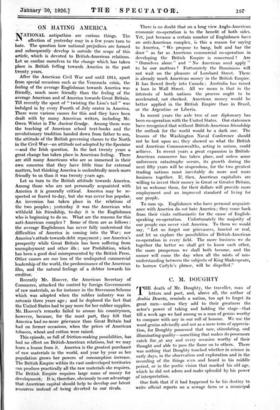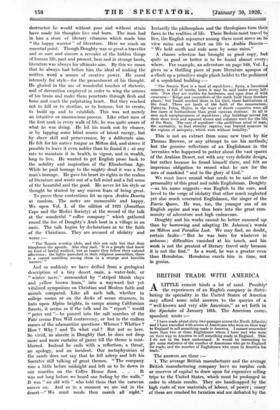C. M. DOUGHTY
THE death of Mr. Doughty, the traveller, man of letters and poet, and, above all, the author of Arabia Deserta, reminds a nation, too apt to forget its great men—unless they add to their greatness the actor's power of taking and holding the stage—that till a week ago we had among us a man of genius worthy to compare with any in our roll of honour. We use the word genius advisedly and not as a mere term of apprecia- tion, for Doughty possessed that rare, stimulating, and illuminating quality—something that makes its possessors catch fire ,at any and every occasion worthy of their thought and able to pass the flame on to others. There was nothing that Doughty touched whether in science in early days, in the observation and exploration and in the recording of the things seen and heard in his middle period, or in the poetic vision that marked his old age, which he did not adorn and make splendid by his power of interpretation.
One feels that if it had happened to be his destiny to write official reports on a sewage farm or a Municipal destructor he would without pose and Without strain have made his thoughts live and burn. The man had in him a stoke of literary vitamins which made him "the happy warrior" of literature. Here we reach an essential point. Though Doughty was sO' great a traveller and So sure and sincere a revealer of the hidden things of human life, past and present, here and in strange lands, literature was always his ultimate aim. By this we mein that he always had before him the -ideal of making the Written Word a source of creative power. He cared intensely for style—for the presentment of his thought. He gloried in the Use of wonderful touches of rhetoric, and of decoration employed in order to wing the arrows Of his .brain and make them. penetrate through flesh and been& and reach the palpitating heart. But they reached not to kill or to sterilize, or . to bemuse, but to create, to build up and to establish. This Was not merely an intuitive or unconscious process. Like other men of the first rank in every Walk of life; he was quite aware of what he was doing: He hit his mark not by chance, or by tapping soine blind Source of latent energy,- but by sheer skill and perseverance, by a deliberate aim. He felt for his native tongue as Milton did, and strove if possible to leave it even nobler than he found it ; at any rate to maintain it in health, in vigour, and in wealth, long to live. He wanted to get English prose back to the nobility and inspiration of the Elizabethan Age. While he paid .homage to the mighty dead it was a free man's homage! He gave his heart its rights in the realms of literature and-wrote out of a full mind and a full sense of the beautiful and the good. He never let his style or thought be Stinted by any craven fears of being great. - To prove these contentions let us open Arabia Deserta at random. • The sortes are memorable and happy. We open Vol. I. of the edition of .1921 (Jonathan Cape and the Medici Society) at the record of the talk at the wonderful "coffee company" which gathered round the fire of Doughty's Arab host in a village in an oasis. The talk begins by declarations as to the faith of the Christians. They are accused of idolatry and 'worse " The Nazara worship idols, and this not only but that they blaspheme the apostle. Also they said, • It is a people that know no kind of lawful wedlock, but as beasts they follow their natural affections; the lights quenched in their religious assemblies, there is a cursed meddling among them in a strange and horrible manner.' " And so suddenly we have drifted from a geological description of a tiny desert oasis, a water-hole, or "winter mere,'' surrounded by "striped bluish Clays and yellow brown loam," into a wayward but yet vitalized symposium on Christian and Moslem faith and Morals compared. Like all such talk,- whether in college 'rooms or on the decks of ocean steamers, in hilts upon Alpine heights, in 'camps among Californian forests, t Seenis as if the talk and its " report " would "peter 'out "-L-be poured into the salt marshes of the Fate..versu.r Free Will Controversy, or lost in the endless mazes Of the adamantine questions : Whence ? Whither ? How'? Why ? and To what 'end? But not so here. So vivid, SO' sincere is -Doughty that he does not drop • . • more and more curtains of gauze till the theine is mist- . .. blurred. Inatead he ends with a reflection) a threat, an apology, and an incident. Our metaphysician of the 'panda 'does not say that he fell asleep and left his Sikrates-- still talking of great ,themes. themes. " The company rose a little before 'Midnight and left us to -lie down in our mantles on the Coffee House floor. . . . It Was not long before we heard one feeling by the walls." It was "an old wife" who told them that the caravan moves on And so in. a Moment we are but in the desert—" We nniii needs then march all night." Instantly the philosophers and the theologians turn their faces to the realities of life. These Beduin must travel t4 live, the English sojourner among them Must move on tAil view ruins and to reflect on life in Arabia Deserta- " We held south and rode soon by some ruins.
A chance selection has brought us good copy, but quite as good or better is to be found almost every- where. For example, an adventure on page-168, Vol. gives us a thrilling piece of pure literature apropos of a thrill) Up a primitive single plank ladder to the pediineni of a sepulchral building "The Semitic East is a land of sepulchres ; Syria, a limeateriel country, is full of tombs, hewn it may be said udder every' hill11 side. Now they are stables for, herdsmen, and open dens of wild creatures—' Kings and counsellors of the earth built them desolate' places,' but Isaiah mocked them in his tinie, those habitations ot the dead. These are lands of the faith of the resurrection4 Palmyra, Petra, Hejira, in the ways of desert countries were alL less oases of husbandman than great caravan stations. In all is seen such sumptuousness of Sepulchres; clay buildings' served foil their short lives and squared stones and columns were for the life of the State. The care of sepulture—the ambitious mind of man,) the mortality, to lead eternity captive, was beyond measure ir the regions of antiquity, which were without humility."
This is not an extract from some new tract by Thomas Browne, or any attempt to use his methodsj but the genuine reflections of an Englishman in the( 'seventies who happened to potter about the vast spaces of the Arabian Desert, not with any very definite design, but rather because he found himself there, and felt an imperious obligation to record what he saw for the uses of mankind "and to the glory of God."
We must leave unsaid what needs to be said on the personality of this great and noble Englishman. Doughty —as his name suggests—was English to the core, and loved to the verge of idolatry that other much neglected yet also much venerated Englishman, the singer of the Faerie Qwen. He was, too, the younger son of an English squire and was thus born into the great com- munity of adventure and high endeavour.
Doughty and his works cannot be better summed upj than by borrowing and adapting Dr. Johnson's words! on Milton and Paradise Lost. We may find, no doubt,i certain faults—" But he was born for whatever is; arduous ; difficulties vanished at his touch, and his work is not the greatest of literary travel only because it is not the first." In a word, he was a greater even' than Herodotus. Herodotus excels him in time, not in genius.



















































 Previous page
Previous page